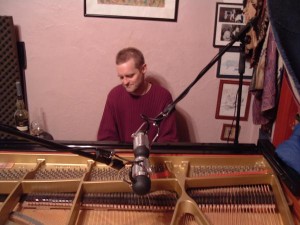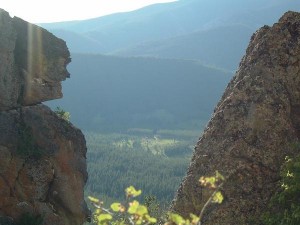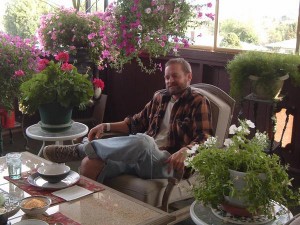 How many professional horn players do you know who have a piano album out? I know one. As I listened to Chris Komer’s piano improvisations the other day, I noticed several things about these short-but-sweet moments captured in time. I could hear the expansiveness of Kansas and Montana. I could hear crisp jazz riffs of the city. I heard a sense of flow and of exploration and adventure that still managed to be gentle, easy, and cohesive. In short, I heard Chris!
How many professional horn players do you know who have a piano album out? I know one. As I listened to Chris Komer’s piano improvisations the other day, I noticed several things about these short-but-sweet moments captured in time. I could hear the expansiveness of Kansas and Montana. I could hear crisp jazz riffs of the city. I heard a sense of flow and of exploration and adventure that still managed to be gentle, easy, and cohesive. In short, I heard Chris!
I’ve had the pleasure of performing many, many times with Chris over the years – in Broadway pits, with Orpheus Chamber Orchestra, and on an eclectic collection of other gigs that New York freelancers do. He, like his music, has an easy, gentle way about him, yet he possesses the highest of standards. As he said to everyone in a recent Schoenberg rehearsal with Orpheus Chamber Orchestra, “Don’t worry. We’ll bring it.” And “bring it” he does!
To me, Chris has always been the embodiment of versatility and flexibility as a musician, and what I find especially impressive is how he manages to explore so many genres, instruments, and avenues while never losing his edge on the horn – an instrument that really demands your all. In his album notes, he writes:
“One of the great things about life is enjoying the people you meet and the places you experience during the journey. If you are too focused on the final destination you miss many of the finer things that are right under your nose. I have been extremely lucky to travel the world playing music and have met many incredible people from all walks of life. But to me the most rewarding journey of all is the miraculously sublime, rapturous, sometimes melancholy, and often solitary journey of self-expression. If you can make that a daily trip and one that is truly exciting and fun then life is full and you no longer have any need for distractions.”
We were too rushed on our last job together to have a chance to sit down and do a proper interview, but he graciously agreed to be “interviewed” over email, and this is the result.
Hometown: Merriam, Kansas
Schools: Wichita State University (3 years), Cleveland Institute of Music (1 year), Manhattan School of Music (2 years)
Major Horn Teachers: Jim Funkhauser, Nick Smith, Richard Solis, David Jolley
Can you tell me a little bit about how you got your start on horn?
I started cornet in fourth grade. In the sixth grade I started horn because no one played it and a friend of the family had one I could borrow. I soon joined the Junior Youth Symphony of Kansas City – a good full-sized orchestra. I think the first rehearsal was Swan Lake. I was hooked from then on. I kept playing trumpet in jazz band in junior high and picked up the trombone to play in jazz band in high school because my horn teacher wasn’t too pleased about me playing trumpet and not focusing on the horn. So I just didn’t tell him about the trombone. He found out anyway, of course. I guess I knew in Junior High that I wanted to try to play music for a living. Since I was good at the horn and loved playing orchestra music it eventually got narrowed down to horn. In college I put the trombone away but began dabbling on piano. Eventually I got good enough to play in one of the school big bands. I took some improvisation classes and one year of private lessons (on piano).
I know you’re involved in a great many things in New York, not just horn playing – but can you tell me a little bit about your work life in New York as a horn player? What have been your favorite things about it? And what have you found to be the most challenging things about being a freelancer in New York?
Well, the great thing about New York is the variety – and the fact that you can take whatever you are into all the way. I play Broadway shows, jazz gigs, recording dates, chamber music gigs, and get to tour the world with artists like Barbra Streisand. And I get to play with a very good orchestra (the New Jersey Symphony) on a very regular basis and sub quite a bit with the Orpheus Chamber Orchestra. I also teach horn at Princeton University. The bad thing is there is a lot of schlepping from place to place and NYC can be a bit stressful because of the noise pollution and the traffic and all the people.
I would love to get your opinion about the state of the arts right now. I don’t know about you, but sometimes I feel like the world is changing REALLY fast, and the music industry seems to be in peril. Do you have any thoughts about this? Do you see the changes in the world as being bad for our art form? If so, do you have any thoughts on how to respond?
Well, I agree, things look grim for the arts in general right now. The fact is, the arts have always had to struggle to survive bottom lines…and they always WILL have to struggle. But great art and great artists will always survive and there will always be an audience for it. The truth is, with the internet, and with the sudden availability of all types of music to everyone, more and more people are getting into music in a much deeper way than ever before. More kids are learning instruments than ever before. Whereas attendance at major league ball games are down, more and more kids are getting into music and dance than ever before. I read that over one thousand kids tried out for the Cadets of Bergen County (a drum and bugle corps) – twice the amount from the year before. So the spin is not altogether accurate. Not every professional orchestra will survive these times but many will, and many new groups are being formed and are thriving. Yes, I am an eternal optimist, but I truly believe that things will turn back towards quality (like acoustic sound versus amplified sound) and away from hype and abrasiveness.
Stemming from this question, what do you think are the most important things for young horn players – thinking about going into music, or already on a path in music – to know or consider. What advice would you have for them?
The key for young horn players (and young musicians in general these days) is to be versatile. Learn to improvise, learn different styles of music, and be able to adapt your sound and style to fit both the orchestral sound and a woodwind quintet. Be able to play on the leg and off the leg and know when to do which. And check out all kinds of music and check it out live as much as possible. Also, learn different instruments that may strike your fancy. Some things you learn on other instruments actually carry over to horn playing.
Also, make your practicing interesting and fun. If you are bored with practicing, something is very wrong. This is extremely important. Whatever it takes…I found that learning to improvise and playing other instruments was what I needed to do. I also found that learning to improvise even moderately well opened up all sorts of new doors.
One note about improvising – the big ol’ elephant in the room is called inhibition. So when beginning to improvise, make sure no one can hear you – because you will sound like an idiot for quite a while. And remember that it is a process of three steps forward and two steps back. You will make progress and then you will get frustrated and stop. Then the bug will bite you again and you will try to do it some more. If you stick with it, eventually it will become incredibly rewarding.
So can you describe for me in what way learning to improvise helps you when you sit down to play in the classical world? Is it the non-inhibition thing? Is it that your brain has had to work in different ways and you approach classical playing with more inner freedom?
Well, yes, it has to do with inner freedom. This inner freedom that the process of learning to improvise brings will bring a simpler, more natural aspect to phrasing. It will allow all of your music to simply “breathe” much more naturally and give your “classical” playing a much more improvised-sounding aspect.
Now am I remembering correctly that you have some method books out?
I have three books out, but Mike Davis is the master behind all of them. The very beginner books have a couple of tracks that actually try to get you improvising. Mike is an incredible jazz trombone player and he did all the work on these books not me. They come with play-along CDs and one even has a DVD with me demonstrating some things.
[Check out Michael Davis’ website at www.hip-bonemusic.com to find Chris’s books]
Now for the extra-fun stuff: Tell me about your interests outside of the horn and some of the projects you have been involved with.
 Well, I guess I can plug my retreat project in Montana here. In 2007, I somehow managed to get my hands on sixty acres in the mountains of Montana, in the middle of the Lewis and Clark National Forest! My plan was to build a unique cooperative artist community from scratch – yup, from scratch! Lo and behold, four years later the project is actually underway.
Well, I guess I can plug my retreat project in Montana here. In 2007, I somehow managed to get my hands on sixty acres in the mountains of Montana, in the middle of the Lewis and Clark National Forest! My plan was to build a unique cooperative artist community from scratch – yup, from scratch! Lo and behold, four years later the project is actually underway.
If you like camping, right now you can come stay as long as you like in the summer, if you are willing to get your hands dirty. The website is www.thunderheadrefuge.org. We have a blast out there, and the work doesn’t feel like work because of the place and the vision. I invite everyone reading this to come. Don’t be shy – we need more help!!
What CDs do you have out these days?
Well, I am sideman on quite a few jazz records now. On some of them I am improvising, others not. Some of the artists I have worked with recently are Ryan Keberle, Marta Topferova, Jamie Baum, Donny McCaslin, and Gary Morgan. But the big news is I released a solo piano CD with all original music – something that had been in the works for quite sometime. It is called Travlin’ Music (folk songs, ballads and improvisations). It is jazzy and folky but hopefully sounds fresh and original too. You can hear some cuts on my MySpace page. (www.myspace.com/ChrisKomer.) A second solo piano CD is nearing completion as well.
I do want to release my own jazz horn record eventually. People have been asking me for a long time when that is going to happen. I do perform from time to time with my own quintet (horn, tenor/soprano sax, piano, bass, drums) with my own original charts and arrangements, so it is only a matter of time.
I heard from our colleague Jacqui Adams (of Genghis Barbie fame these days!) that you have some pretty stellar books to recommend. Can you tell me about those? Do you have any favorite good reads that you would recommend for young horn players?
This is a great question and one which few people ever ask me. But, yes, I can recommend some very good books that have inspired me through the years.
The Artist Way by Julia Cameron: Incredible stuff. This book should be handed out on day one at every music school in the country. It is a handbook for artists of all types and an incredibly powerful tool for seeing your creative dreams become reality. There are actually three books in the series now, but all of her books, including her autobiography are incredibly inspirational. She talks about all the stuff your private teachers and professors and your parents never talk about.
The Seth Books by Jane Roberts: OK – these books will turn your whole view of the universe upside-down in a most magical and positive way. Get ready to have your minds blown. I think there are eight or nine books in the series. Any great musician (artist) needs to delve deep into his/her own mind at some point and these books help you do it.
Effortless Mastery by Kenny Werner: Kenny is a great jazz pianist who has written a beautiful book about the mystical side of making music. We need more books like this. His ideas and guided meditations (this book also comes with a CD) can be applied to many things in life besides music.
Learn to Play Jazz and Improvise by Jamey Abersold: These books (each book comes with a play along CD) were the main tool I used to teach myself how to improvise and play over chord changes. One tip: don’t get bogged down with the book. Just put the CD on and start playing along. Your ear is your main teacher. Warning: playing improvised music is a highly addictive activity.
A couple of other books: The Inner Game of Tennis, Zen and the Art of Archery – these help with the mental side of horn playing. Also, Zen and the Art of Motorcycle Maintenance, which talks about the tricky subject of defining quality.
I also recommend reading biographies and autobiographies of musicians and artists – always enlightening and inspirational. Some recent ones that I enjoyed immensely are biographies of Bill Evans, Salvador Dali, Marc Chagall, Jaco Pastorious, and Vincent Van Gogh (who wrote near the end of his life….”I have now resigned myself to the fact that I will never amount to anything as a painter….”)
Thank you so much, Chris, for sharing your thoughts and inspirational ideas and suggestions. I look forward to hearing how all of your projects continue to grow and progress!
Resources:
www.myspace.com/chriskomer – Chris’s MySpace page
www.thunderheadrefuge.org – website for his artists’ retreat Thunderhead Refuge
www.hip-bonemusic.com – Michael Davis’ site which contains some warm-up books/CDs and books for learning improvisation that feature Chris.

